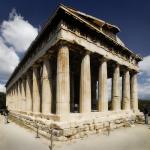|
This section contains 1,466 words (approx. 5 pages at 300 words per page) |

|
Performance Culture.
The ancient Greeks had a love of pageantry and formalized ritual that permeated their entire society. The poet Homer composed long ballads orally, narratives of great warriors and great human themes. Wandering rhapsodes ("recitors of poetry") memorized these poems and performed them for audiences at banquets and festivals that were public performances in and of themselves. Religious rituals involving all aspects of what we now call drama were performed publicly as well: weddings, funerals, celebrations to honor the gods, and victories in performative competitions of all kinds. Most of the formal elements of theater—people acting out specific roles, appropriate costumes, a set order of events, as well as audience expectation and participation—already existed in the religious rituals the Greeks had been performing for hundreds of years. For the Greeks, performance was an integral part of all aspects of...
|
This section contains 1,466 words (approx. 5 pages at 300 words per page) |

|




